Organisational Behaviour Essay: Deloitte Employee Talent Management
VerifiedAdded on 2020/02/24
|6
|1570
|89
Essay
AI Summary
This essay provides an analysis of Deloitte's strategies for finding and developing employee talent. It begins by outlining the key personality characteristics Deloitte seeks in its employees, such as leadership, interpersonal skills, and effective communication. The essay then explores Deloitte's various programs, including verbal reasoning aptitude tests and the Deloitte Career Connections program, designed to enhance employee performance, identify employee interests, and improve retention. The analysis includes discussions on the benefits of these programs, such as saving costs and improving employee satisfaction. The essay also examines the application of motivational theories and attribution processes within Deloitte's talent management framework, concluding that training programs play a vital role in shaping employee performance and retention.
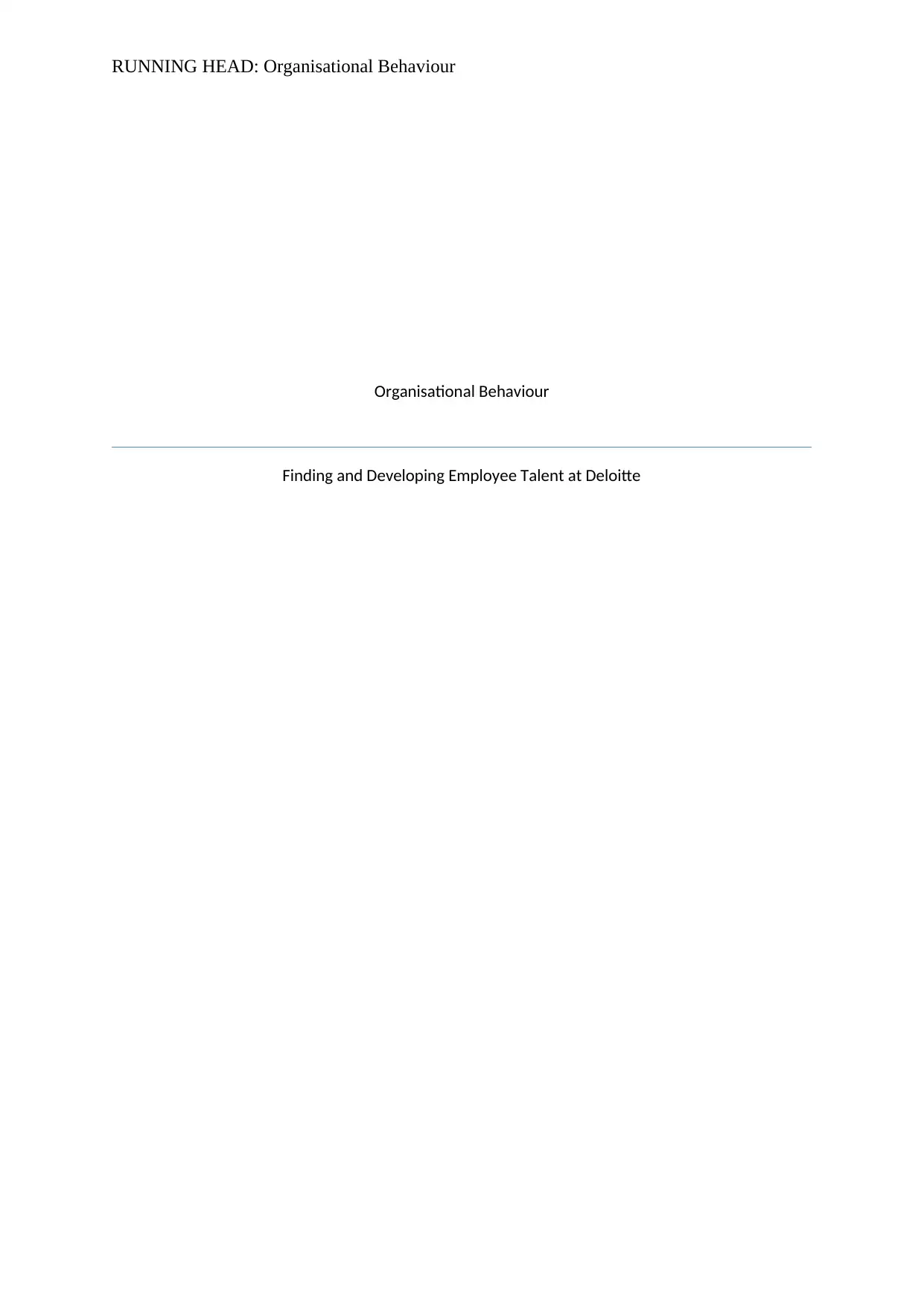
RUNNING HEAD: Organisational Behaviour
Organisational Behaviour
Finding and Developing Employee Talent at Deloitte
Organisational Behaviour
Finding and Developing Employee Talent at Deloitte
Paraphrase This Document
Need a fresh take? Get an instant paraphrase of this document with our AI Paraphraser
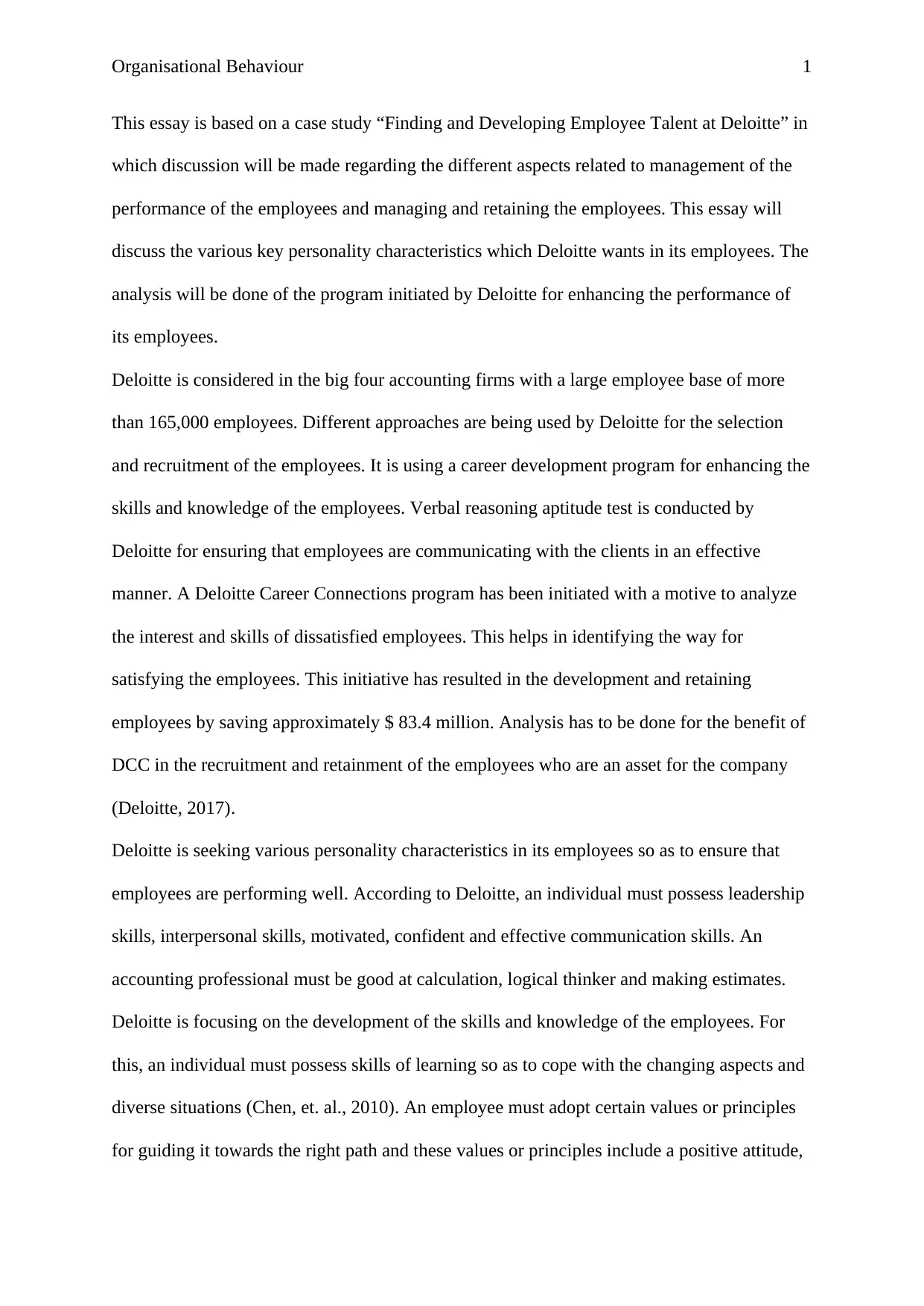
Organisational Behaviour 1
This essay is based on a case study “Finding and Developing Employee Talent at Deloitte” in
which discussion will be made regarding the different aspects related to management of the
performance of the employees and managing and retaining the employees. This essay will
discuss the various key personality characteristics which Deloitte wants in its employees. The
analysis will be done of the program initiated by Deloitte for enhancing the performance of
its employees.
Deloitte is considered in the big four accounting firms with a large employee base of more
than 165,000 employees. Different approaches are being used by Deloitte for the selection
and recruitment of the employees. It is using a career development program for enhancing the
skills and knowledge of the employees. Verbal reasoning aptitude test is conducted by
Deloitte for ensuring that employees are communicating with the clients in an effective
manner. A Deloitte Career Connections program has been initiated with a motive to analyze
the interest and skills of dissatisfied employees. This helps in identifying the way for
satisfying the employees. This initiative has resulted in the development and retaining
employees by saving approximately $ 83.4 million. Analysis has to be done for the benefit of
DCC in the recruitment and retainment of the employees who are an asset for the company
(Deloitte, 2017).
Deloitte is seeking various personality characteristics in its employees so as to ensure that
employees are performing well. According to Deloitte, an individual must possess leadership
skills, interpersonal skills, motivated, confident and effective communication skills. An
accounting professional must be good at calculation, logical thinker and making estimates.
Deloitte is focusing on the development of the skills and knowledge of the employees. For
this, an individual must possess skills of learning so as to cope with the changing aspects and
diverse situations (Chen, et. al., 2010). An employee must adopt certain values or principles
for guiding it towards the right path and these values or principles include a positive attitude,
This essay is based on a case study “Finding and Developing Employee Talent at Deloitte” in
which discussion will be made regarding the different aspects related to management of the
performance of the employees and managing and retaining the employees. This essay will
discuss the various key personality characteristics which Deloitte wants in its employees. The
analysis will be done of the program initiated by Deloitte for enhancing the performance of
its employees.
Deloitte is considered in the big four accounting firms with a large employee base of more
than 165,000 employees. Different approaches are being used by Deloitte for the selection
and recruitment of the employees. It is using a career development program for enhancing the
skills and knowledge of the employees. Verbal reasoning aptitude test is conducted by
Deloitte for ensuring that employees are communicating with the clients in an effective
manner. A Deloitte Career Connections program has been initiated with a motive to analyze
the interest and skills of dissatisfied employees. This helps in identifying the way for
satisfying the employees. This initiative has resulted in the development and retaining
employees by saving approximately $ 83.4 million. Analysis has to be done for the benefit of
DCC in the recruitment and retainment of the employees who are an asset for the company
(Deloitte, 2017).
Deloitte is seeking various personality characteristics in its employees so as to ensure that
employees are performing well. According to Deloitte, an individual must possess leadership
skills, interpersonal skills, motivated, confident and effective communication skills. An
accounting professional must be good at calculation, logical thinker and making estimates.
Deloitte is focusing on the development of the skills and knowledge of the employees. For
this, an individual must possess skills of learning so as to cope with the changing aspects and
diverse situations (Chen, et. al., 2010). An employee must adopt certain values or principles
for guiding it towards the right path and these values or principles include a positive attitude,
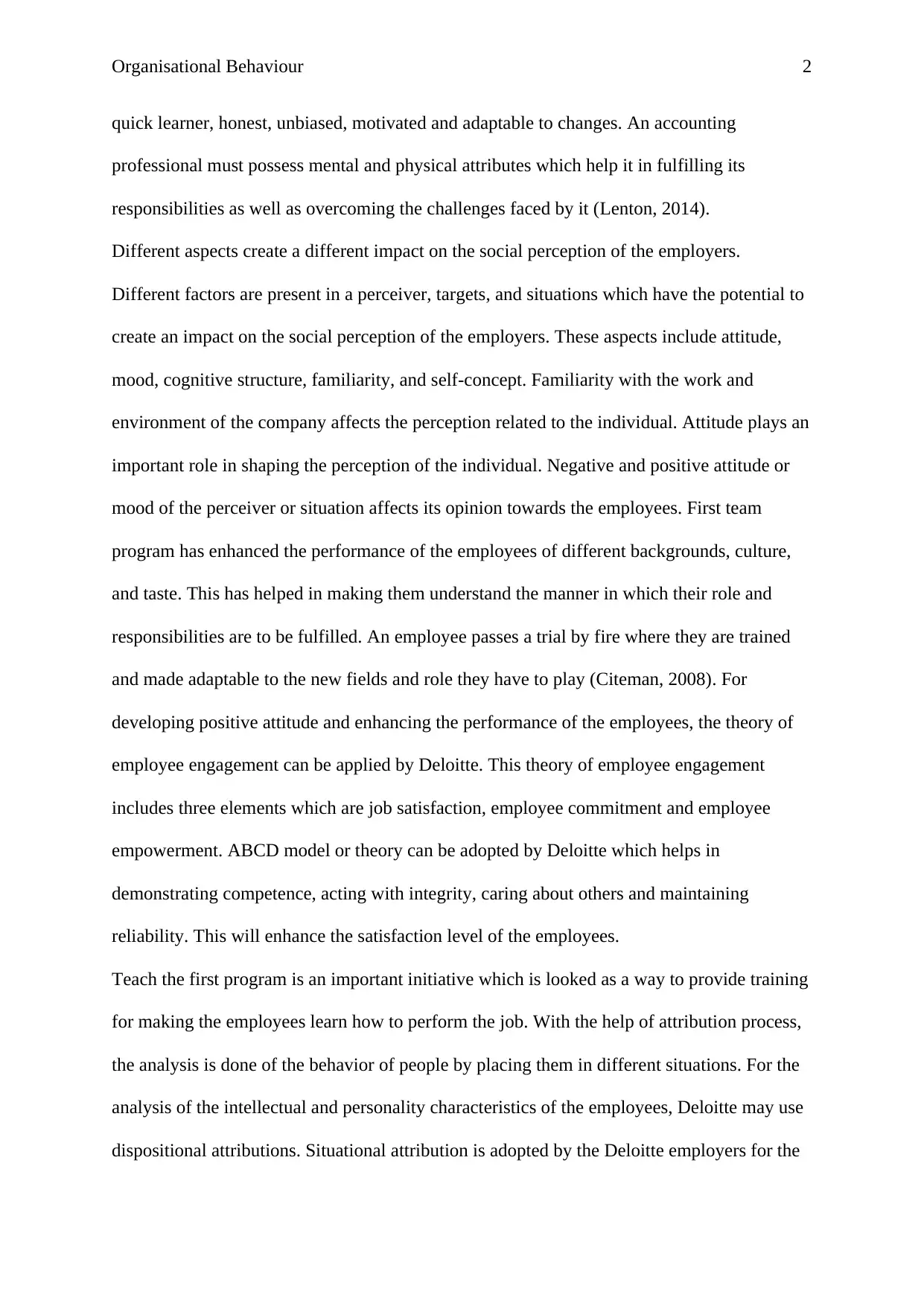
Organisational Behaviour 2
quick learner, honest, unbiased, motivated and adaptable to changes. An accounting
professional must possess mental and physical attributes which help it in fulfilling its
responsibilities as well as overcoming the challenges faced by it (Lenton, 2014).
Different aspects create a different impact on the social perception of the employers.
Different factors are present in a perceiver, targets, and situations which have the potential to
create an impact on the social perception of the employers. These aspects include attitude,
mood, cognitive structure, familiarity, and self-concept. Familiarity with the work and
environment of the company affects the perception related to the individual. Attitude plays an
important role in shaping the perception of the individual. Negative and positive attitude or
mood of the perceiver or situation affects its opinion towards the employees. First team
program has enhanced the performance of the employees of different backgrounds, culture,
and taste. This has helped in making them understand the manner in which their role and
responsibilities are to be fulfilled. An employee passes a trial by fire where they are trained
and made adaptable to the new fields and role they have to play (Citeman, 2008). For
developing positive attitude and enhancing the performance of the employees, the theory of
employee engagement can be applied by Deloitte. This theory of employee engagement
includes three elements which are job satisfaction, employee commitment and employee
empowerment. ABCD model or theory can be adopted by Deloitte which helps in
demonstrating competence, acting with integrity, caring about others and maintaining
reliability. This will enhance the satisfaction level of the employees.
Teach the first program is an important initiative which is looked as a way to provide training
for making the employees learn how to perform the job. With the help of attribution process,
the analysis is done of the behavior of people by placing them in different situations. For the
analysis of the intellectual and personality characteristics of the employees, Deloitte may use
dispositional attributions. Situational attribution is adopted by the Deloitte employers for the
quick learner, honest, unbiased, motivated and adaptable to changes. An accounting
professional must possess mental and physical attributes which help it in fulfilling its
responsibilities as well as overcoming the challenges faced by it (Lenton, 2014).
Different aspects create a different impact on the social perception of the employers.
Different factors are present in a perceiver, targets, and situations which have the potential to
create an impact on the social perception of the employers. These aspects include attitude,
mood, cognitive structure, familiarity, and self-concept. Familiarity with the work and
environment of the company affects the perception related to the individual. Attitude plays an
important role in shaping the perception of the individual. Negative and positive attitude or
mood of the perceiver or situation affects its opinion towards the employees. First team
program has enhanced the performance of the employees of different backgrounds, culture,
and taste. This has helped in making them understand the manner in which their role and
responsibilities are to be fulfilled. An employee passes a trial by fire where they are trained
and made adaptable to the new fields and role they have to play (Citeman, 2008). For
developing positive attitude and enhancing the performance of the employees, the theory of
employee engagement can be applied by Deloitte. This theory of employee engagement
includes three elements which are job satisfaction, employee commitment and employee
empowerment. ABCD model or theory can be adopted by Deloitte which helps in
demonstrating competence, acting with integrity, caring about others and maintaining
reliability. This will enhance the satisfaction level of the employees.
Teach the first program is an important initiative which is looked as a way to provide training
for making the employees learn how to perform the job. With the help of attribution process,
the analysis is done of the behavior of people by placing them in different situations. For the
analysis of the intellectual and personality characteristics of the employees, Deloitte may use
dispositional attributions. Situational attribution is adopted by the Deloitte employers for the
⊘ This is a preview!⊘
Do you want full access?
Subscribe today to unlock all pages.

Trusted by 1+ million students worldwide
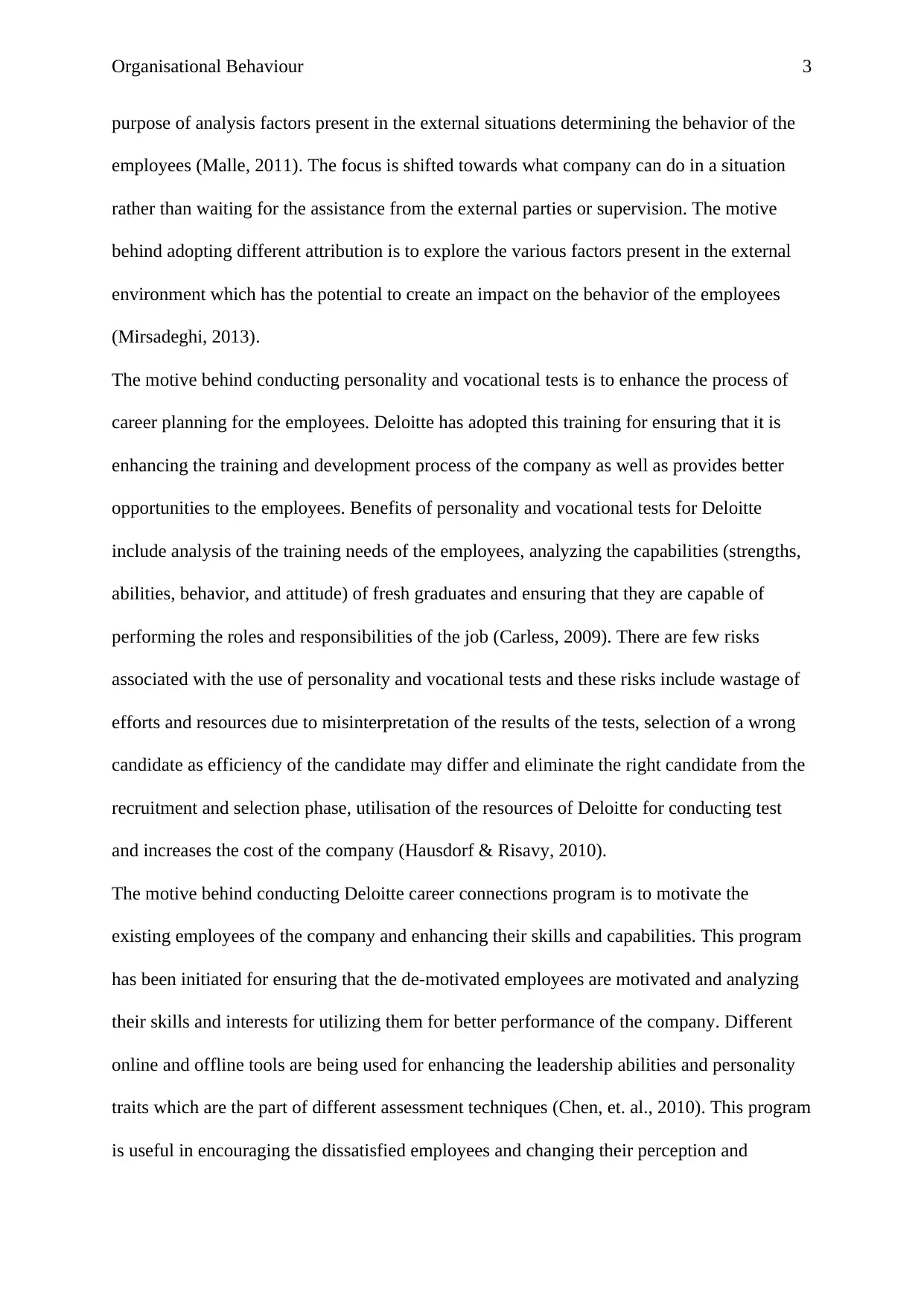
Organisational Behaviour 3
purpose of analysis factors present in the external situations determining the behavior of the
employees (Malle, 2011). The focus is shifted towards what company can do in a situation
rather than waiting for the assistance from the external parties or supervision. The motive
behind adopting different attribution is to explore the various factors present in the external
environment which has the potential to create an impact on the behavior of the employees
(Mirsadeghi, 2013).
The motive behind conducting personality and vocational tests is to enhance the process of
career planning for the employees. Deloitte has adopted this training for ensuring that it is
enhancing the training and development process of the company as well as provides better
opportunities to the employees. Benefits of personality and vocational tests for Deloitte
include analysis of the training needs of the employees, analyzing the capabilities (strengths,
abilities, behavior, and attitude) of fresh graduates and ensuring that they are capable of
performing the roles and responsibilities of the job (Carless, 2009). There are few risks
associated with the use of personality and vocational tests and these risks include wastage of
efforts and resources due to misinterpretation of the results of the tests, selection of a wrong
candidate as efficiency of the candidate may differ and eliminate the right candidate from the
recruitment and selection phase, utilisation of the resources of Deloitte for conducting test
and increases the cost of the company (Hausdorf & Risavy, 2010).
The motive behind conducting Deloitte career connections program is to motivate the
existing employees of the company and enhancing their skills and capabilities. This program
has been initiated for ensuring that the de-motivated employees are motivated and analyzing
their skills and interests for utilizing them for better performance of the company. Different
online and offline tools are being used for enhancing the leadership abilities and personality
traits which are the part of different assessment techniques (Chen, et. al., 2010). This program
is useful in encouraging the dissatisfied employees and changing their perception and
purpose of analysis factors present in the external situations determining the behavior of the
employees (Malle, 2011). The focus is shifted towards what company can do in a situation
rather than waiting for the assistance from the external parties or supervision. The motive
behind adopting different attribution is to explore the various factors present in the external
environment which has the potential to create an impact on the behavior of the employees
(Mirsadeghi, 2013).
The motive behind conducting personality and vocational tests is to enhance the process of
career planning for the employees. Deloitte has adopted this training for ensuring that it is
enhancing the training and development process of the company as well as provides better
opportunities to the employees. Benefits of personality and vocational tests for Deloitte
include analysis of the training needs of the employees, analyzing the capabilities (strengths,
abilities, behavior, and attitude) of fresh graduates and ensuring that they are capable of
performing the roles and responsibilities of the job (Carless, 2009). There are few risks
associated with the use of personality and vocational tests and these risks include wastage of
efforts and resources due to misinterpretation of the results of the tests, selection of a wrong
candidate as efficiency of the candidate may differ and eliminate the right candidate from the
recruitment and selection phase, utilisation of the resources of Deloitte for conducting test
and increases the cost of the company (Hausdorf & Risavy, 2010).
The motive behind conducting Deloitte career connections program is to motivate the
existing employees of the company and enhancing their skills and capabilities. This program
has been initiated for ensuring that the de-motivated employees are motivated and analyzing
their skills and interests for utilizing them for better performance of the company. Different
online and offline tools are being used for enhancing the leadership abilities and personality
traits which are the part of different assessment techniques (Chen, et. al., 2010). This program
is useful in encouraging the dissatisfied employees and changing their perception and
Paraphrase This Document
Need a fresh take? Get an instant paraphrase of this document with our AI Paraphraser
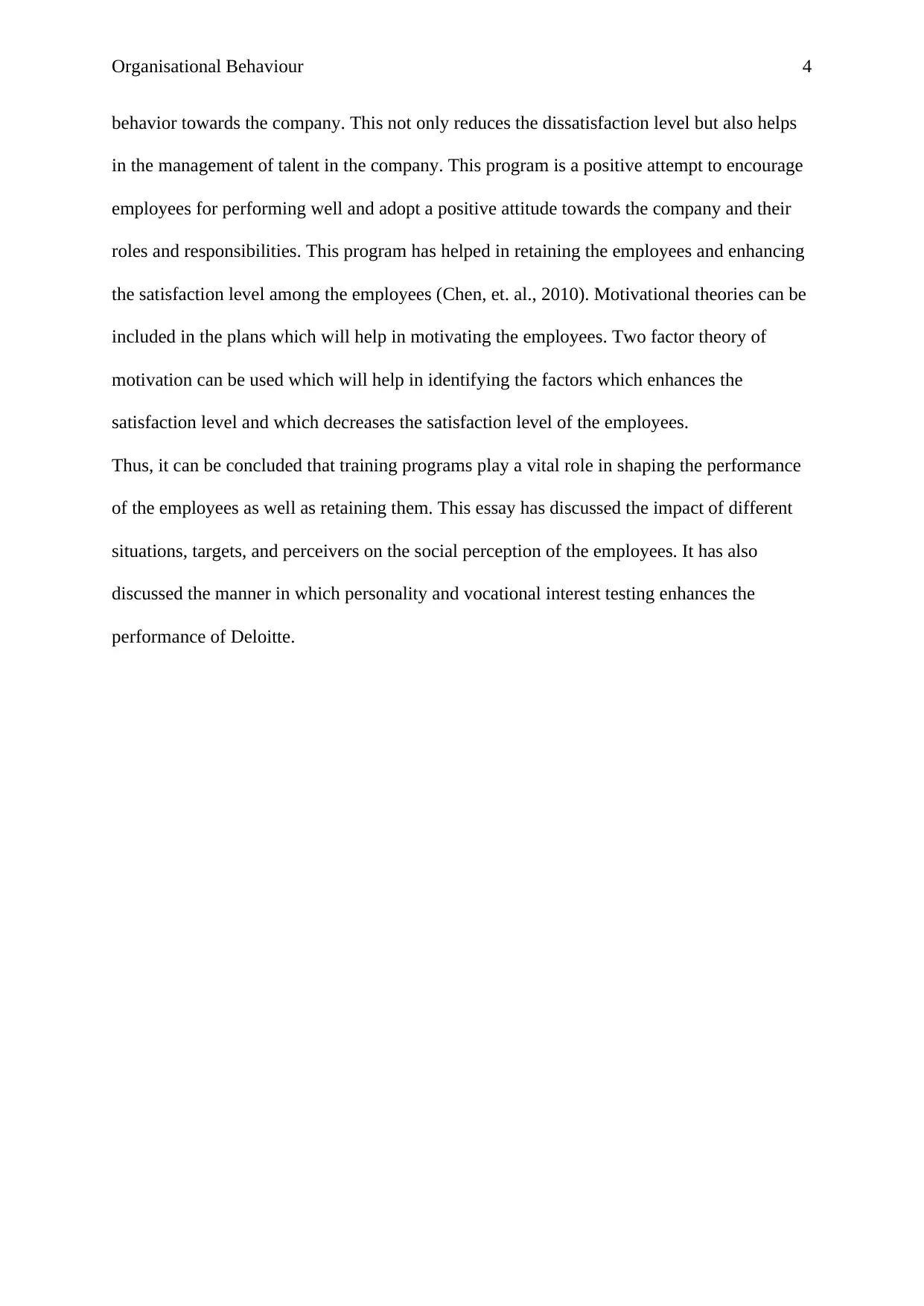
Organisational Behaviour 4
behavior towards the company. This not only reduces the dissatisfaction level but also helps
in the management of talent in the company. This program is a positive attempt to encourage
employees for performing well and adopt a positive attitude towards the company and their
roles and responsibilities. This program has helped in retaining the employees and enhancing
the satisfaction level among the employees (Chen, et. al., 2010). Motivational theories can be
included in the plans which will help in motivating the employees. Two factor theory of
motivation can be used which will help in identifying the factors which enhances the
satisfaction level and which decreases the satisfaction level of the employees.
Thus, it can be concluded that training programs play a vital role in shaping the performance
of the employees as well as retaining them. This essay has discussed the impact of different
situations, targets, and perceivers on the social perception of the employees. It has also
discussed the manner in which personality and vocational interest testing enhances the
performance of Deloitte.
behavior towards the company. This not only reduces the dissatisfaction level but also helps
in the management of talent in the company. This program is a positive attempt to encourage
employees for performing well and adopt a positive attitude towards the company and their
roles and responsibilities. This program has helped in retaining the employees and enhancing
the satisfaction level among the employees (Chen, et. al., 2010). Motivational theories can be
included in the plans which will help in motivating the employees. Two factor theory of
motivation can be used which will help in identifying the factors which enhances the
satisfaction level and which decreases the satisfaction level of the employees.
Thus, it can be concluded that training programs play a vital role in shaping the performance
of the employees as well as retaining them. This essay has discussed the impact of different
situations, targets, and perceivers on the social perception of the employees. It has also
discussed the manner in which personality and vocational interest testing enhances the
performance of Deloitte.
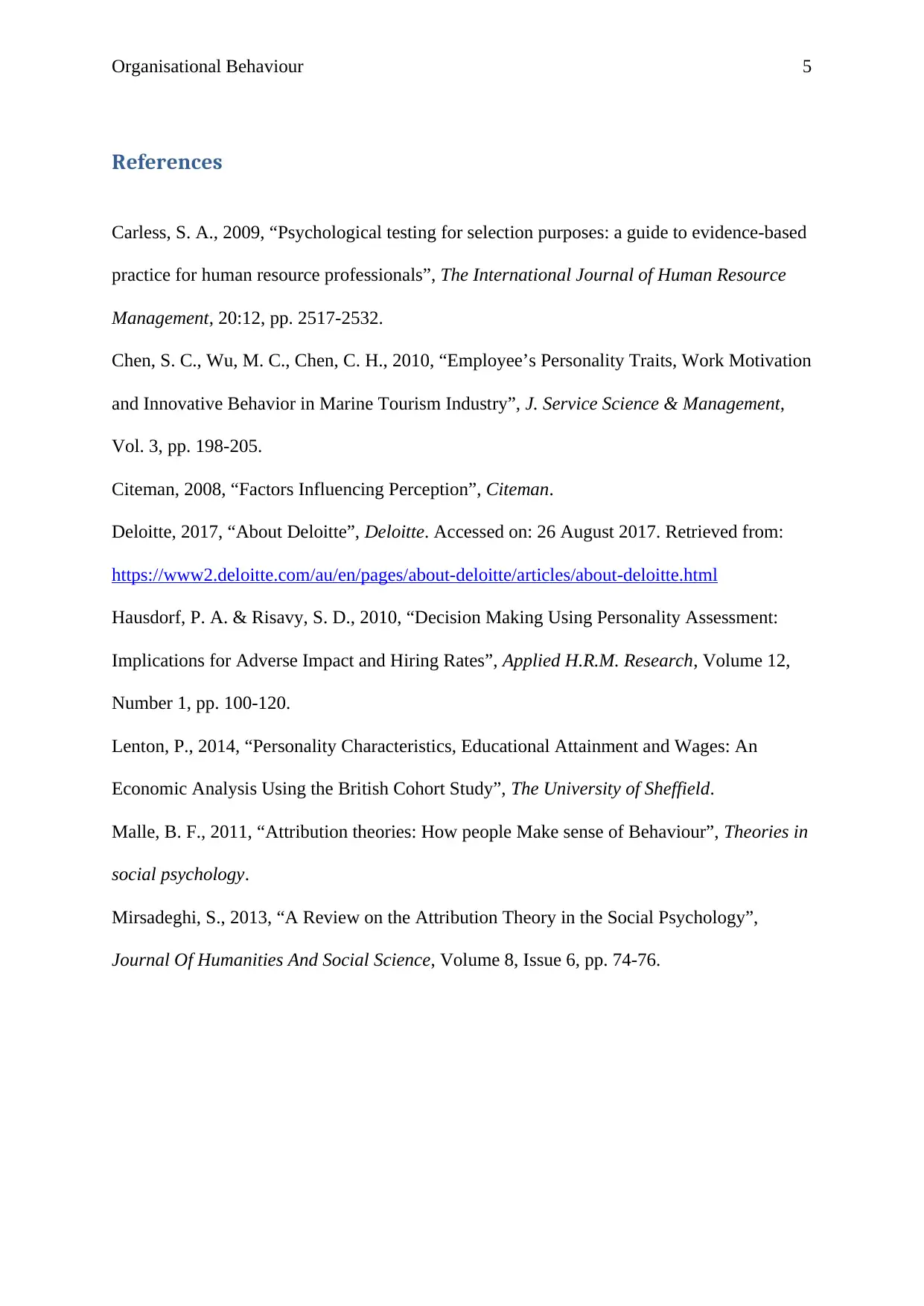
Organisational Behaviour 5
References
Carless, S. A., 2009, “Psychological testing for selection purposes: a guide to evidence-based
practice for human resource professionals”, The International Journal of Human Resource
Management, 20:12, pp. 2517-2532.
Chen, S. C., Wu, M. C., Chen, C. H., 2010, “Employee’s Personality Traits, Work Motivation
and Innovative Behavior in Marine Tourism Industry”, J. Service Science & Management,
Vol. 3, pp. 198-205.
Citeman, 2008, “Factors Influencing Perception”, Citeman.
Deloitte, 2017, “About Deloitte”, Deloitte. Accessed on: 26 August 2017. Retrieved from:
https://www2.deloitte.com/au/en/pages/about-deloitte/articles/about-deloitte.html
Hausdorf, P. A. & Risavy, S. D., 2010, “Decision Making Using Personality Assessment:
Implications for Adverse Impact and Hiring Rates”, Applied H.R.M. Research, Volume 12,
Number 1, pp. 100-120.
Lenton, P., 2014, “Personality Characteristics, Educational Attainment and Wages: An
Economic Analysis Using the British Cohort Study”, The University of Sheffield.
Malle, B. F., 2011, “Attribution theories: How people Make sense of Behaviour”, Theories in
social psychology.
Mirsadeghi, S., 2013, “A Review on the Attribution Theory in the Social Psychology”,
Journal Of Humanities And Social Science, Volume 8, Issue 6, pp. 74-76.
References
Carless, S. A., 2009, “Psychological testing for selection purposes: a guide to evidence-based
practice for human resource professionals”, The International Journal of Human Resource
Management, 20:12, pp. 2517-2532.
Chen, S. C., Wu, M. C., Chen, C. H., 2010, “Employee’s Personality Traits, Work Motivation
and Innovative Behavior in Marine Tourism Industry”, J. Service Science & Management,
Vol. 3, pp. 198-205.
Citeman, 2008, “Factors Influencing Perception”, Citeman.
Deloitte, 2017, “About Deloitte”, Deloitte. Accessed on: 26 August 2017. Retrieved from:
https://www2.deloitte.com/au/en/pages/about-deloitte/articles/about-deloitte.html
Hausdorf, P. A. & Risavy, S. D., 2010, “Decision Making Using Personality Assessment:
Implications for Adverse Impact and Hiring Rates”, Applied H.R.M. Research, Volume 12,
Number 1, pp. 100-120.
Lenton, P., 2014, “Personality Characteristics, Educational Attainment and Wages: An
Economic Analysis Using the British Cohort Study”, The University of Sheffield.
Malle, B. F., 2011, “Attribution theories: How people Make sense of Behaviour”, Theories in
social psychology.
Mirsadeghi, S., 2013, “A Review on the Attribution Theory in the Social Psychology”,
Journal Of Humanities And Social Science, Volume 8, Issue 6, pp. 74-76.
⊘ This is a preview!⊘
Do you want full access?
Subscribe today to unlock all pages.

Trusted by 1+ million students worldwide
1 out of 6
Related Documents
Your All-in-One AI-Powered Toolkit for Academic Success.
+13062052269
info@desklib.com
Available 24*7 on WhatsApp / Email
![[object Object]](/_next/static/media/star-bottom.7253800d.svg)
Unlock your academic potential
Copyright © 2020–2025 A2Z Services. All Rights Reserved. Developed and managed by ZUCOL.




